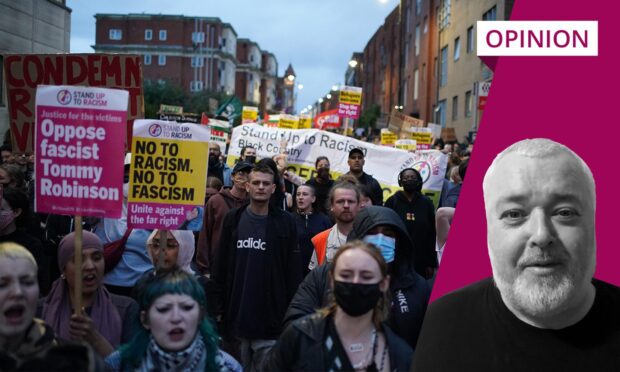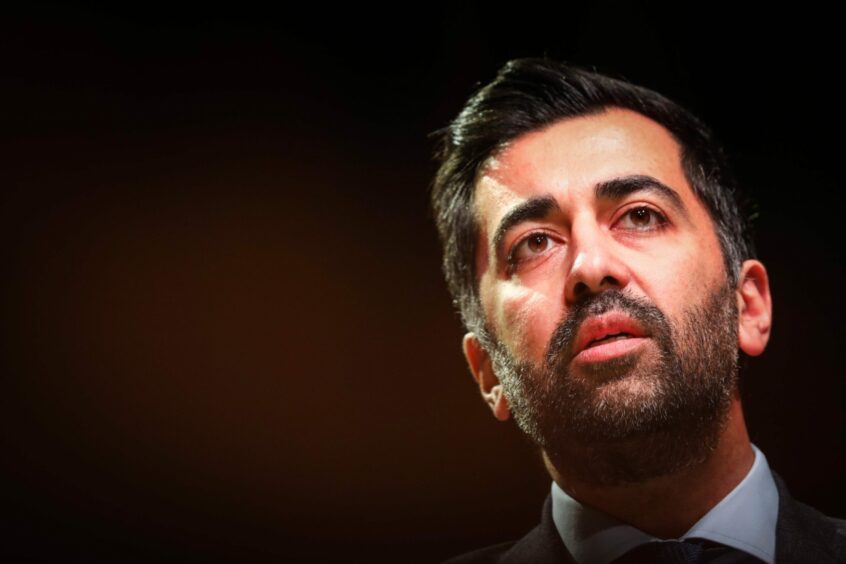One of the most terrifying things about racists is that many of them genuinely don’t realise that’s what they are.
Don’t get me wrong. I’m not making any excuses for the appalling bigots and thugs who’ve been spreading terror In England and Northern Ireland over the past week and a half. I’m cheering on every arrest and conviction.
But I’m quite certain that, in their own minds at least, many of those who’ve been rioting in the streets believe themselves to be good, moral people.
If you asked them whether they hated someone because of the colour of their skin or their faith, they would explain that no, they had “legitimate concerns” or were “seeking answers about immigration.
So I think it is important to start with the first principles here.
Every single person who has joined a “protest” that has led to a riot is a racist.
Every one of them is dangerous. And if a refugee family is burned to death in the place where they sought safety from civil war or torture, every one of them will share some culpability.
If you all keep throwing straws, you all killed that camel.
And any politician, right now, who cannot fully and unequivocally condemn each and every person who has participated in – who has even stepped out of their house to rubberneck – a riot, is no better than the thugs on the streets.
There are no grey areas.
Nothing – not even the horrific murder of three little girls in a dance class – justifies the sickening racism that’s been spreading across Britain.
But it’s not just politicians who need to be clear about this. We all do.
I was absolutely horrified to see the reaction to an interview with former First Minister Humza Yousaf, this week, in which he spoke of his fears for his family in light of recent events.
Here was one of our fellow Scots, a neighbour, a colleague, a parent, speaking openly, honestly – and shockingly – about the fact the colour of his children’s skin makes them vulnerable and the reaction online, well, it made his point for him over and over.
Of course, there was the usual racism – the comes-with-the-job stuff for non-white politicians – but there was also a disturbing amount of whataboutery from people who should know better.
If, after listening to a parent talk of his concern for his children’s safety, your reaction is to criticise his (perfectly mainstream) politics, then you are not the clever one.
You are not a great debater, with a refreshing take on things. I’m afraid there’s something wrong with you.
Racism is alive in Scotland
What we have seen over recent days is race hate, pure and simple.
The people setting fire to hotels housing asylum seekers tried to murder people. There’s no dressing that up.
I’ve spoken in the past with Yousaf about the racism he’s faced, about the compromises he may have made to seem less “different”, and about his determination to confront and challenge Islamophobia.
I know that the last thing the Former First Minister wants to be talking about is race.
He’s not an immigrant, he’s a native Scot and the colour of his skin has nothing to do with his views on the constitution, the NHS, or the justice system.
Those who attacked Yousaf after his interview were not just sending him a message.
They were sending a message to every non-white person in the country that they are lesser, that their fears are either imagined or irrelevant.
On Wednesday, First Minster John Swinney convened a meeting of faith and political leaders in Edinburgh.
This symbolic but important event sent a message to Scots from ethnic minority backgrounds that this is as much their country as it is anyone else’s. How bleak that Swinney felt the need to do this.
When Yousaf spoke out this week, it took real courage.
He has put up with more threats and abuse over the years based on the colour of his skin than anyone might be expected to put up with yet, still, he stepped up, putting a target on his forehead in the process.
Those who sneered at and dismissed Humza Yousaf’s remarks may think they have clever points to make about modern politics and division. They don’t. They’re just racists, nothing more.
Euan McColm is a regular columnist for various Scottish newspapers


Conversation